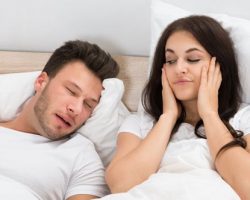
Sleep apnea (suspension of breathing) doesn’t get the press it deserves. This little-known sleep disorder can have a number of not-so-nice effects on your body and on everyday life.
Obstructive sleep apnea occurs when the muscles of the throat relax and temporarily block the airway. The sleep apnea sufferer typically rouses – with a snort and a twitch – just enough to begin normal breathing again. These episodes can occur a few times or even hundreds of times during the night, robbing the person of deep, restorative sleep.
Amazingly, few sleep apnea patients remember waking up at all during the night! They just know that they’re always tired, have no energy, and can’t seem to concentrate.
There are several types of sleep apnea that are due to different causes, but the most common is obstructive sleep apnea. Here are some signs of obstructive sleep apnea to watch for:
- Very loud snoring. Snoring may well be caused by something other than sleep apnea, but the snoring that accompanies severe obstructive sleep apnea is almost certain to disturb a fellow sleeper.
- Dry mouth or sore throat when you awaken. This is probably due to snoring.
- Cessation of breathing. If you’re the person with apnea, you probably won’t remember not breathing for a while, but anyone awake in the room with you certainly will.
- Headaches in the morning.
- Problems with staying asleep, or insomnia.
- Being really sleepy in the daytime.
- Problems paying attention.
- Frequent irritability for no clear reason.
Obstructive sleep apnea is hard on you and on anyone who shares the bedroom with you. It’s not uncommon for significant others to move to another room, either due to the loud snoring or because they can’t stand waiting for you to start breathing again.
Sleep apnea is hard on your body as well as your daily functioning. The episodes of non-breathing deprive your body and brain of oxygen. This can lead to the development of:
- Depression
- Pre-diabetes and diabetes
- Weight gain due to metabolic syndrome
- High blood pressure
- Stroke
- Heart disease
Diagnosing Sleep Apnea
If you complain of being tired all the time, have trouble concentrating, and falling asleep during the day, your medical doctor might suspect sleep apnea. But there are any number of other conditions that can cause the same symptoms.
The only way to know for sure is to have a sleep study performed. During an in-lab sleep study, you have a number of leads attached to various places to monitor movements, changes in your vital signs, your oxygen levels and your brain waves while you sleep. This is the definitive test for sleep apnea.
If you or one of our dentists suspects sleep apnea, we can arrange an in-lab sleep study for you. You’ll know whether you have sleep apnea and if so, whether it’s due to obstruction or stems from some other cause.
Treating Sleep Apnea
Obstructive sleep apnea is usually treated by using a CPAP (Continuous Positive Air Pressure) machine during sleep. CPAPs maintain a constant stream of air through the throat to hold the airway open and allow the person to sleep without disruptions to their breathing.
CPAPs are well-tolerated by many people, but there are some disadvantages. The pressure of the air stream and the mask that’s typically worn can be hard to get used to. The machines produce audible sounds that many sleep apnea sufferers, and their significant others, find hard to tolerate. People who enjoy camping will need to arrange for access to electricity or purchase a battery pack to use their CPAP machine. These battery packs can cost several hundred dollars.
One form of sleep apnea treatment that is rapidly gaining popularity is the use of an oral device. The oral devices that Dr. Duffield and his team offer are designed to sit in your mouth and temporarily adjust the jaw to allow the airway to remain open.
An oral device is much easier for most people to get used to than a CPAP machine. Comfort is a key consideration in treating sleep apnea; unless the underlying cause can be found and corrected, sleep apnea sufferers will need help to enjoy refreshing sleep for the rest of their lives. It’s much easier to take an oral device with you on trips than a CPAP.
Contact Us
If there’s concern that you or a loved might might have sleep apnea, call us at our Royal Oak, MI office at (248) 721-4502 for an appointment. Or send us a message using our online form. We’ll be happy to help you get an accurate diagnosis and the best treatment option.
